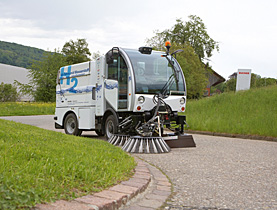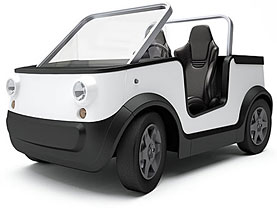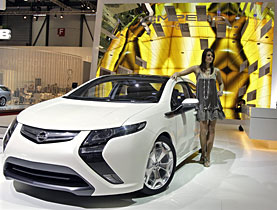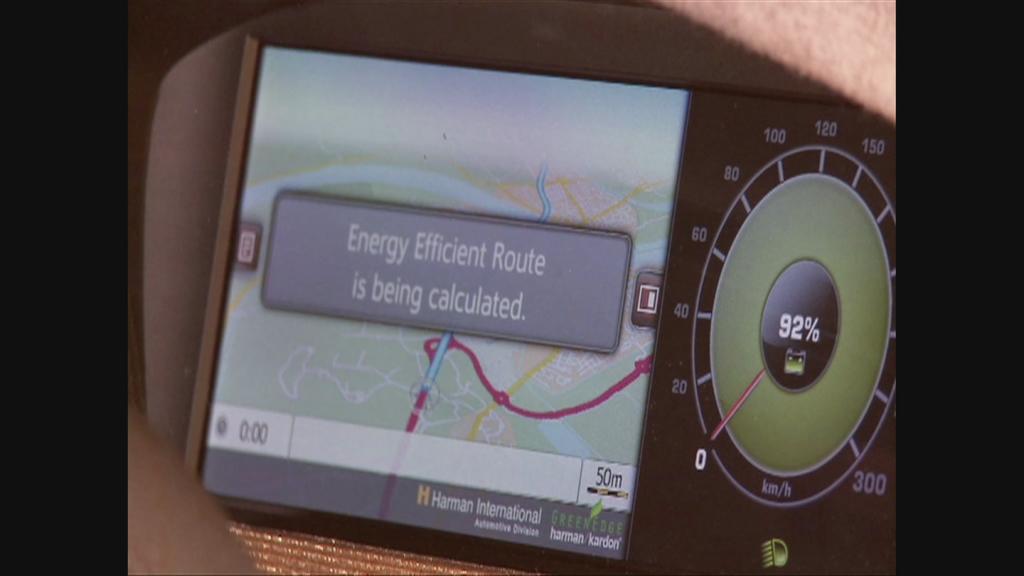“Green” road sweeper promises less pollution

The city of Basel is currently testing the world's first emission-free, hydrogen driven street cleaning vehicle, which has been developed by Swiss scientists.
The road sweeper, which is powered by fuel cell technology, emits no exhaust fume pollutants, which would mean cleaner air for city dwellers.
The Bucher CityCat H2 is the brainchild of researchers at the Swiss Federal Laboratories for Materials Testing and Research (Empa), near Zurich and the Paul Scherrer Institute in Villigen, and is being created with the help of several Swiss and German companies.
“Our aim is to take fuel cell technology out of the laboratory and onto the streets,” said Christian Bach, head of the international combustion engines laboratory at Empa and the hy.muve (hydrogen driven municipal vehicle) project manager.
Fuel cells are considered to be clean energy sources. They convert hydrogen directly into electricity, which is then used to drive the vehicle’s electric motors.
Around seven kilogrammes of hydrogen would be stored on the machine, Bach explained, which converted to electricity, would allow it to run up to eight hours a day.
Clean machine
The vehicle emits no pollutants from its exhaust – just water vapour produced by the chemical reaction between hydrogen and oxygen in the fuel cell – meaning far less air pollution than with conventional diesel engines.
“This type of vehicle will be used for pedestrian areas or in places with lots of people,” Bach told swissinfo.ch.
This could include railway stations or exhibition halls.
Many cities are planning or already have environmental zones. In the British capital London all conventional combustion engines have to pay a fee – the so-called congestion charge – for entering these zones.
A zero-emission machine such as the Swiss one would be allowed in these areas, Bach said.
Drive to market
However, it might take ten to 15 years until hydrogen-driven vehicles come onto the market. “The technology is expensive and it needs time,” said Bach.
First of all, the authorities need to give their approval to the idea if the vehicles are to have any chance of competing against conventional engines.
Secondly, fuel cell system producers are planning to start serial production of these cells in the next five years. This would reduce costs by a considerable amount, the scientist explained.
Large-scale production – several thousand systems per year – might only come about from 2020.
“We estimate that the costs of these vehicles are around 20-40 per cent higher than for today’s diesel vehicles at large-scale production. The technology will be more expensive than in conventional vehicles, also in the future,” Bach said.
However, the hydrogen-powered road sweepers may be ready earlier if the government or local authorities, whom Bach says often are under higher pressure to introduce new green solutions, take the lead.
“We think that the project could also act as a door opener for other fuel-cell applications like city buses or passenger cars,” he added.
Basel motors forth
The Bucher CityCat H2 was unveiled to the public in Basel on May 14 and will be operational on the city’s streets for the next six months. Overall testing will take 18 months and take place in other Swiss cities, such as St Gallen.
Bach says that it is important that the vehicle is manned by municipal drivers rather than project members.
The scientist and his team will monitor how the system ages and how it reacts to weather change, air pollutants or impurities in the hydrogen. Social acceptance, efficiency and cost will also be considered.
One of the local companies involved is Bucher Schörling, a Swiss firm based near Zurich that is a leading manufacturer of municipal vehicles.
“If the market develops, the cost comes down and all the project goals are OK, maybe Bucher will decide to start with the next step of a serial development of such a vehicle,” Bach said.
Isobel Leybold-Johnson in Zurich, swissinfo.ch
The project involves Empa and the Paul Scherrer Institute (PSI), as well as Bucher Schörling, Proton Motor, BRUSA Elektronik AG and Messer Schweiz.
The project is financed by the Federal Institute of Technology in Zurich’s Competence Centre for Energy and Mobility (CCEM), the Federal Energy Office, the various project partners and the pilot regions where the vehicle will be tested.
Similar ideas are being developed across Europe, according to Bach. But these are mostly city buses or passenger cars.
There are several environmentally friendly vehicles being developed in Switzerland. One of them, e’mo, is a small electronic-powered, two-seat runabout created by the Technical University of Rapperswil.
Last year, Swiss entrepreneur Nicolas Hayek – Swatch group chairman – announced the Belenos Clean Power project. It aims to produce the next generation of hydrogen-powered vehicles by harnessing the power of the sun.
Mindset, a Lucerne-based firm, hopes to release the first Swiss-designed hybrid car within around 18 months. Another company, Numexia, based in canton Vaud, in January unveiled a prototype for an electric delivery truck.

In compliance with the JTI standards
More: SWI swissinfo.ch certified by the Journalism Trust Initiative




You can find an overview of ongoing debates with our journalists here. Please join us!
If you want to start a conversation about a topic raised in this article or want to report factual errors, email us at english@swissinfo.ch.